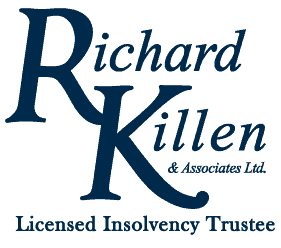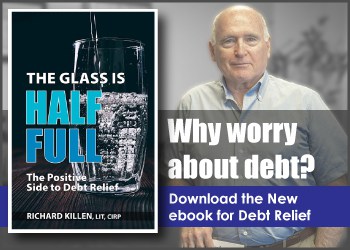10 Signs of Debt Trouble
 If you don’t live in Egypt, being in denial is a bad thing.
If you don’t live in Egypt, being in denial is a bad thing.
Most of us carry some form of debt, whether it’s a car loan or a credit card balance that we just can’t manage to pay off this month. But when does debt load become dangerous?
Well, one sign is when you don’t want to think about it and are kept up nights with stomach-twisting anxiety. The problem scares you so much you put your head in the sand and keep spending as usual.
If you think you have a problem, you probably do. But here are 10 more telling signs that you are sinking too far into a financial morass:
- You frequently pay bills after their due date, incurring secondary notices and penalty charges.
- Creditors are calling about unpaid bills.
- You regularly bounce cheques and overdraw your bank accounts, causing you embarrassment and triggering bank penalties.
- You use one credit card to pay the balance on the other, or use it to pay other bills or to buy necessities.
- You pay only the minimum balance on credit card bills.
- You’ve been denied credit because your debt ratio is too high, or need a co-signor for a loan because you are too much of a risk by yourself.
- You hit up family and friends for loans to make ends meet.
- You don’t know how much debt you’re really in, because you’re afraid to hear the number.
- You hide purchases and debt problems from your family, or you fight a lot with your spouse over debt issues.
- An unexpected expense, such as a car repair, sends you into panic mode.
Of course, just not thinking about money problems, or running way from them, doesn’t work. They always manage to find you. The best way to deal with them is head on, using the advice of a trusted expert. At Richard Killen & Associates, we can lead you through the appropriate responses to your particular situation, whether it is debt consolidation, a consumer proposal or bankruptcy.
Contact us for a free consultation – it will be the most stress-relieving call you will ever make.
Why Do People Go Bankrupt?
 Well, because their debts exceed their means to pay them.
Well, because their debts exceed their means to pay them.
OK, after stating the obvious, here’s a bit more detail. More than 118,000 Canadians a year are filing for bankruptcy or doing consumer proposals. Here are some of the top reasons why.
Excessive Use of Credit
Not surprisingly, this continues to be leading cause of bankruptcy. Many of us spend too much, save too little and rely too much on plastic credit. The problem of being overextended can combine with one of the reasons below to push people over the edge. While carrying a heavy debt load, they might, for example, get sick and become unable to work, leading to financial disaster. Mortgages, bank and finance company loans, taxes and student loans are some of the other types of credit that fall into this mix.
Job Loss or Seasonal Employment
If you lose your job, or are without work for extended periods, then it is hard to stay on top of debt payments. Even having work hours cut back or overtime eliminated can lead to financial problems. To make ends meet, a cash-strapped family might turn to credit cards to pay monthly bills, digging a deeper hole for themselves. Building an emergency fund is the best way to cope with this kind of problem.
Medical Problems
The difficulties with medical issues aren’t as acute in Canada, with our public health care, as they are in the United States, where serious diseases or injuries can lead to massive bills that can wipe out savings, retirement accounts and education funds. Still, if you are laid up and can’t work, without adequate insurance or savings, then a spiral down into insolvency may be inevitable. And not all medical costs are covered by health care or insurance.
Marital Dissolution
Divorce and separation can cause a number of financial hardships. First there can be hefty legal fees, which themselves may drive people into bankruptcy. Division of assets, child support and alimony can also cause severe problems. Wage garnishments, if support or alimony payments are not kept up, can drive some ex-spouses over the edge. And others who don’t receive their court-mandated support can also find themselves floundering.
The list of other common financial pitfalls can include failed businesses, non-payment of taxes, inadequate pensions, unexpected disasters and gambling problems. When faced with these kinds of problems, you should seek out the advice of an experienced Licensed Insolvency Trustee, such as Richard Killen & Associates, who will guide you through your options and help you find the quickest road to recovery.
What Happens to My Retirement?

If that comes about, one of the concerns you may have is what will happen to your retirement savings and your pension? Well, generally speaking, you have nothing to worry about. Though the legal process can get a little complicated, for the most part nothing will happen to your RRSPs, RIF, LIF, especially your government pension or company pension.
Other kinds of plans might sometimes be affected, depending on various factors. However, you don’t have to wonder or worry; you can get the facts from us, Richard Killen & Associates. That’s what we’re here for.
So call Richard Killen & Associates today for a free consultation at our office nearest you. We have offices across the GTA. 888-545-5365. Or visit us online at killen.ca. It may be the most stress-relieving call you ever make.
See also “A New Problem for the Old.”
Money Doesn’t Grow on Trees

For more than 20 years, Bill had run a successful Toronto tree care business, doing tree removals, pruning, planting and much more. His finances fell into the rhythm of the growing season. In the spring, the work would flood in and then taper off into the summer and fall.
In the winter, during his downtime, Bill would use credit cards to finance advertising, equipment purchases, insurance payments and personal expenses. He would depend on the work coming in the following spring to pay things off and get him ahead in the game.
The system worked until a few years ago, when a perfect storm of bad luck gave his credit heart rot. First the nature of the business had changed, with the Internet killing off traditional advertising channels and flooding the market with cut-rate competition, often under-insured and without much real experience, but still appealing to the price-conscious consumer.
Then there was the economy that had taken a plunge, limiting people’s budgets for yard care. “If they only have $3,000 and have a choice between getting tree work done or going on a vacation, what do you think they are going to choose?” says Bill.
But the leaf that broke the branch was the four trips on credit that he took to Costa Rica, arranging to bring his new wife back to Canada. “I thought that I’d make up the money with the spring boom,” he says, “except that that year it didn’t come.”
Bill found himself with a maxed out line of credit and three credit cards owing about $12,000 apiece. He was finally unable to make payments that were high as $5,000 a month. “I felt real shame,” he recalls. “Once I had walked around with a thousand bucks in my pocket and now I didn’t have enough money to buy food for my wife and baby. That’s really scary.”
A friend suggested he go to Richard Killen & Associates, to get a free consultation so he could understand his options to deal with the crisis. “When I went in to see Richard [Killen], I felt horrible,” he says. “But by the time, I left I felt excellent. It was the best day I had in a long time.”
A large part of the Licensed Insolvency Trustee’s job was to give Bill a reality check. Still deep “in denial,” he hoped that he could find someone to give him a loan to buy his way out of the crisis. Killen pointed out that throwing more money into the pit would not solve his financial problem and would in fact make his position worse.
When people see a trustee they learn that they have options other than to simply go bankrupt. One of the most important things the trustee should do is carefully explain the consequences of the various options available. In Bill’s case;, after fully digesting what Killen explained to him, he determined that the best course of action was bankruptcy.
Bill’s main concern was that he needed to keep his business going, because like everyone else he still had to earn a living for himself and his family. As Richard explained, a bankruptcy would not deprive Bill of that right. Even in complying with the legal requirements of the bankruptcy, Bill was able to keep all his equipment, including his tree truck, and chipper – the mainstays of his business.
It came as a big surprise to Bill to find out that a bankruptcy generally allows a self employed person to retain his ability to make a living. Most people believe or have heard that if they go bankrupt they lose everything. That’s just not the case.
Today discharged from his bankruptcy, Bill is more careful about how he uses credit for his business. He tries to pay as he goes with a debit card. He and his wife have a secured credit card with a $2,000 limit, ensuring any credit used is covered by what they have in the bank. “I pay off my balance right way,” he says.
As far as his seasonal business, last winter’s ice storm has proven to be a real boon, providing all the tree debris removal business he can handle in the spring. Still, Bill is acutely aware of how quickly his fortunes can change in this line of work, like a healthy maple suddenly brought down by blight.
Asked about what he could do to protect himself from such vagaries, he smiles and says, “We could always move back to Costa Rica. Money goes a lot further there.”
Gail Vaz Oxlade Budget Calculator for the True Cost of Debt

The Gail Vaz Oxlade budget calculator can be used to calculate the true cost of debt. Many people do not have a clear idea of what their debt really costs them, whether it is a credit card balance or a student loan.
Financial writer Gail Vaz-Oxlade points out in “How Much is Your Debt Costing You?” that if someone buys a $2,000 TV on credit, with an 18% interest rate, the minimum monthly payment would be about $40. Of that payment, only about $10 would go to the principle and rest would cover the interest. So if you just made minimum payments, the $2,000 TV would cost you $7,000 and would take 30 years to pay off.
To tally up the true costs of your debts, the sites for many financial institutions and credit-counselling agencies have calculators available for free use. All you need to do is to punch in your numbers and weep.
Credit Counselling Canada, the national association of non-profit credit counselling and government agencies, offers links to a variety of calculators. They include ones designed to help you to get a clear picture of your debt situation, change your spending patterns for your home budget, determine repayment strategies for your loans and lines of credit, track your weekly expenses and show you how to reach your savings goal. Its SMART (Specific, Measurable, Attainable, Relevant, Time-Bound) Worksheet can aid you in setting financial goals and putting them in action.
Most banks offer calculators to help you figure the cost of loans before you sign on the dotted line. Typical is TD Canada Trust’s Debt Repayment Calculator. Select your type of debt, the amount of the loan and interest rate, and then you’ll get back the numbers for how much you’ll pay in total, over what period of time. If the numbers for your debts become oppressive, TD also offers a Debt Consolidation Loan Calculator, showing how you can ease your situation by consolidating all your debts into a single loan, with one monthly payment that is probably lower than what you are paying overall now.
Students about to enter university or college, and their parents, should point their browsers to the Government of Canada’s CanLearn Loan Repayment Estimator. Enter your settings and it will help you estimate the monthly payments you’ll need to make to repay your Canada Student Loan or other government student loans. Simply enter the total amount of your loan(s), select the interest rate and grace period options, and decide on the number of monthly payments that you would like to make. You can also compare repayment options. The trick is to pay off the student loan before you hit retirement age.
Just dial 1-888-545-5365 and we can start talking about how you can improve your financial situation.
If you are in debt and have questions about the Gail Vaz Oxlade budget calculator, we would be happy to help you find a proper solution to your problem.
Relief From Collection Agencies
 Hi. I’m Richard Killen, from Richard Killen & Associates. When you fall behind in your debt payments and creditors and agencies start calling, simply answering the phone can be an ordeal, especially if it’s never happened to you before.
Hi. I’m Richard Killen, from Richard Killen & Associates. When you fall behind in your debt payments and creditors and agencies start calling, simply answering the phone can be an ordeal, especially if it’s never happened to you before.
As a Licensed Insolvency Trustee, I see people in this kind of situation every day. The good news is that we at Richard Killen can actually help you with this problem.
The Bankruptcy & Insolvency Act immediately puts a stop to collection calls, lawsuits, even garnishees, and you don’t even have to go bankrupt. But only a trustee like Richard Killen & Associates can provide this for you.
So call Richard Killen & Associates today for a free, no commitment consultation at our office nearest you. We have offices across the GTA. Call 888-545-5365. Or visit us online at killen.ca. It may be the most stress-relieving call you ever make.
Serenity After Trial
 “I thought the process was going to be hideous, humiliating and shameful,” Karen recalls of her bankruptcy more than a decade ago. “I was terrified when I went to see Richard Killen. I was in tears as I walked into his office.”
“I thought the process was going to be hideous, humiliating and shameful,” Karen recalls of her bankruptcy more than a decade ago. “I was terrified when I went to see Richard Killen. I was in tears as I walked into his office.”
Karen’s story of battling debt is a familiar one. She had decided to make a brave midlife career change from working as a bartender. Finding employment in a Toronto health food store, she made the decision to go back to school to get certified as holistic nutritionist.
In classes for two years and working for close to minimum wage, she had to get student loans to make ends meet. And when this money fell short, she dipped into a line of credit.
“I found myself in about $30,000 of debt,” says Karen. “Things had gotten out of hand. I was scared and didn’t know what to do. But I talked to a friend who had gone through a similar crisis and he suggested I go to see Richard at Richard Killen & Associates.”
Karen was quickly reassured in her first meeting with Richard. “I sat down in the chair and he just made me laugh – in a nice way. He was just very kind to me. He assured me that this kind of thing happens to people and it doesn’t mean that they are bad or that they have to go through a humiliating experience.”
Killen points out that making mistakes simply qualifies all of us for membership in the human race. “We all make mistakes – every day,” he says from his Toronto office. “It’s what we do about them that defines who we are. This is something we forget when we are swamped by the problems.”
Killen then outlined her options, helping Karen to realize that not only could she survive but successfully manage the bankruptcy process. Most importantly, he made her realize that the choices were hers – nobody else’s. “He never left me hanging. If I called he was always available,” she says. “I always knew how I was doing during the nine months of the bankruptcy process.”
Karen was fortunate to able clear away her student loans along with her other debts when she received her bankruptcy discharge. “Student loans are different from regular debts such as credit cards,” explains Killen. “They are not given for normal profit-making reasons. They are meant to help us improve our future life by improving our education, so it’s understandable that they should be given special status under the law. A person has to make a reasonable effort to pay them back. However, sometimes no matter how hard a person tries they just can’t do it. If after seven years a person still can’t pay then the student loans qualify to be treated like any commercial debt. This is what happened with Karen”
Within a year of going bankrupt, Karen hit her new career path with full force. She managed a series of health food stores, worked in an holistic apothecary and had clients on the side for her holistic nutrition counselling.
A couple of years ago, she decided to make another major life change – less a career shift than giving herself space to understand and act upon her priorities, truly achieving that elusive work-life balance. She returned to the support network of friends and family in small-town Nova Scotia. And while she considers her next move, she is doing part-time work and volunteering in the kitchen of a Buddhist centre, practising meditation and finding a measure of serenity in the combination.
“The great thing is,” says Karen, “if I hadn’t gone through the bankruptcy process I wouldn’t be where I am today. It’s given me the space to get on with my life. As hard and distasteful it was to contemplate beforehand, it turned out to be one of the best things I could have done.”
Informal Arrangements Need Full Agreement
One of the options in dealing with a debt crisis is an informal arrangement. This is essentially reorganizing the debts that you have with the creditors you owe the money to.
We’re not talking here about a consolidation loan. That’s different because you end up with only one creditor if can consolidate your debts. An informal arrangement involves renegotiating the debts you have with the creditors themselves. You still end up with the same creditors, but your payment obligations have been reduced. For instance, you could extend a term on a loan or change a credit card debt into a loan.
What Are the Alternatives in Coping With a Debt Crisis?
 No one wants to go bankrupt. It is the last resort when faced with insurmountable financial problems. But even if your payments are in arrears and you are getting collection calls, there are other options besides a bankruptcy, which we at Richard Killen & Associates are glad to explain. These include:
No one wants to go bankrupt. It is the last resort when faced with insurmountable financial problems. But even if your payments are in arrears and you are getting collection calls, there are other options besides a bankruptcy, which we at Richard Killen & Associates are glad to explain. These include:
Getting a Consolidation Loan
If you can qualify for a consolidation loan, you can bundle all your debts into a single package and make a monthly payment that will probably be lower than what you are faced with right now with all the individual payments. You can usually reduce interest and stretch out your repayment period. The trick is qualifying for the loan if your credit rating has taken a beating because of your financial difficulties. To get approved, you may need collateral, or a co-signor or guarantor – not always easy to find.
Making an Informal Arrangement
You can, perhaps, negotiate with creditors to reduce monthly payments. Or you might be able to get them to accept less than the full amount owed, if you have a lump sum payment you can make. In either case, you should use the services of a licensed trustee, lawyer, accountant or reputable credit counselling agency to do this, and beware of the many unscrupulous sorts out there poised to take advantage of your situation. Other pitfalls of this method include: the high degree of difficulty in conducting negotiations; creditors who can still sue you; no protection from garnishees; it doesn’t stop interest accumulation; and it needs to be accepted by all creditors before it can be effective.
Offering a Consumer Proposal
A consumer proposal is a legally binding agreement between you and your unsecured creditors to settle all your unsecured debts. It is filed with the government and managed by a licensed trustee, such as Richard Killen & Associates, under the supervision of the court. You will probably wind up paying back only a portion of what you owe – for instance 10, 20, or 30 per cent – and so get the debt relief you need without going bankrupt.
How this differ from the two options above? The three main advantages are:
- You don’t have to negotiate with each creditor separately.
- You only need a simple majority of the debts to be in favour, not all of them, to get it accepted.
- The creditors have to listen to you. If they ignore your offer they will be stuck with it, so you will have their attention.
In other words, you will be negotiating a settlement of all you unsecured debts from a position of more-or-less equality with your creditors. We usually don’t think of ourselves as being in that position with the banks and credit card companies, do we?
A proposal also stops all interest charges, halts lawsuits and garnishees, and does not require direct individual negotiations (the trustee handles this for you).
Everyone’s situation is different. To decide what is the best method of dealing with your debt problems, you need expert advice. At Richard Killen & Associates we offer a free assessment consultation, so you will have a clear picture of what your options are.
Stop Harassment by Creditors
 Debt collectors can be, uh, zealous in their pursuit of money owed. Stories of daily phone calls, threats, bothering friends and relatives, and late-night contacts abound. In some cases debt collectors have aggressively pursued ridiculously small amounts of money, and even gone after people who owe nothing at all.
Debt collectors can be, uh, zealous in their pursuit of money owed. Stories of daily phone calls, threats, bothering friends and relatives, and late-night contacts abound. In some cases debt collectors have aggressively pursued ridiculously small amounts of money, and even gone after people who owe nothing at all.
The point is, there are limits to what these agencies can do to collect cash. In Ontario, the Collections Agencies Act lays out the boundaries that, when crossed, constitute illegal harassment.
For example, a debt collector can’t make any calls to a debtor until six days after mailing written notice with the name of the creditor, balance owing on the debt and the identity of the collection agency.
They are also not allowed to make calls on statutory holidays, on Sundays, except between the hours of 1 and 5 p.m., or on any other day of the week between the hours of 9 p.m. and 7 a.m. And they cannot contact the person more than three times in a seven-day period.
If a debt collector does get you on the phone, they cannot threaten you, swear at you, lie to you or harass you. They cannot seize your assets until they have won a court judgment. They can only contact your employer to get your employment information, unless your employer has guaranteed your debt or the call is about a legal action, such as garnisheeing your wages.
And they can only contact your family, friends, neighbours and acquaintances once to get your address and phone number, unless these people have guaranteed your loan or you have given permission for them to be contacted (in a contract, most likely).
Read more about your rights dealing with collection agencies here. While it’s generally better to speak to a collection agency, rather than avoid them, to deal with the problem, you don’t have to talk to them if you don’t want to.
If they do harass you or threaten you or try to intimidate you in some way, they may be breaking law. You have the right to report them to the police or phone company, or file a complaint to the Ministry of Consumer Affairs.










